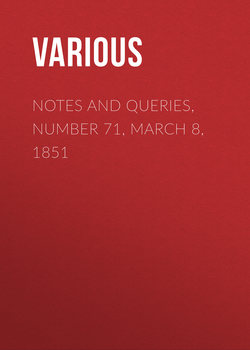Читать книгу Notes and Queries, Number 71, March 8, 1851 - Various - Страница 1
Notes
ON TWO PASSAGES IN "ALL'S WELL THAT ENDS WELL."
ОглавлениеAmong the few passages in Shakspeare upon which little light has been thrown, after all that has been written about them, are the following in Act. IV. Sc. 2. of All's Well that Ends Well, where Bertram is persuading Diana to yield to his desires:
"Bert. I pr'ythee, do not strive against my vows:
I was compell'd to her; but I love thee
By love's own sweet constraint, and will for ever
Do thee all rights of service.
Dia. Ay, so you serve us,
Till we serve you: but when you have our roses,
You barely leave our thorns to prick ourselves,
And mock us with our bareness.
Bert. How have I sworn?
Dia. 'Tis not the many oaths that make the truth;
But the plain single vow, that is vow'd true.
What is not holy, that we swear not by,
But take the Highest to witness: Then, pray you, tell me,
If I should swear by Jove's great attributes,
I love'd you dearly, would you believe my oaths,
When I did love you ill? this has no holding,
To swear by him whom I protest to love,
That I will work against him."
Read—"when I protest to Love."
It is evident that Diana refers to Bertram's double vows, his marriage vow, and the subsequent vow or protest he had made not to keep it. "If I should swear by Jove I loved you dearly, would you believe my oath when I loved you ill? This has no consistency, to swear by Jove, when secretly I protest to Love that I will work against him (i.e. against the oath I have taken to Jove)."
Bertram had sworn by the Highest to love his wife; in his letter to his mother he says:
"I have wedded her, not bedded her, and sworn to make the not eternal:"
he secretly protests to Love to work against his sacred oath; and in his following speech he says:
"Be not so cruel-holy, Love is holy."
He had before said:
"–do not strive against my vows:
I was compell'd to her; but I love thee
By Love's own sweet constraint:"
clearly indicating that this must be the true sense of the passage. By printing when for whom, and Love with a capital letter, to indicate the personification, all is made clear.
After further argument from Bertram, Diana answers:
"I see that men make ropes in such a scarre
That we'll forsake ourselves."
This Rowe altered to "make hopes in such affairs," and Malone to "make hopes in such a scene." Others, and among them Mr. Knight and Mr. Collier, retain the old reading, and vainly endeavour to give it a meaning, understanding the word scarre to signify a rock or cliff, with which it has nothing to do in this passage. There can be no doubt that "make ropes" is a misprint for "make hopes," which is evidently required by the context, "that we'll forsake ourselves." It then only remains to show what is meant by a scarre, which signifies here anything that causes surprise or alarm; what we should now write a scare. Shakspeare has used the same orthography, scarr'd, i.e. scared, in Coriolanus and in Winter's Tale. There is also abundant evidence that this was its old orthography, indicative of the broad sound the word then had, and which it still retains in the north. Palsgrave has both the noun and the verb in this form: "Scarre, to scar crowes, espouventail." And again, "I scarre away or feare away, as a man doth crowes or such like; je escarmouche." The French word might lead to the conclusion that a scarre might be used for a skirmish. (See Cotgrave in v. Escarmouche.) I once thought we should read "in such a warre," i.e. conflict.
In Minshen's Guide to the Tongues, we have:
"To Scarre, videtur confictum ex sono oves vel aliud quid abigentium et terrorem illis incutientium. Gall. Ahurir ratione eadem:" vi. to feare, to fright.
Objections have been made to the expression "make hopes;" but the poet himself in King Henry VIII. has "more than I dare make faults," and repeats the phrase in one of his sonnets: surely there is nothing more singular in it than in the common French idiom, "faire des espérances."
S. W. Singer.
